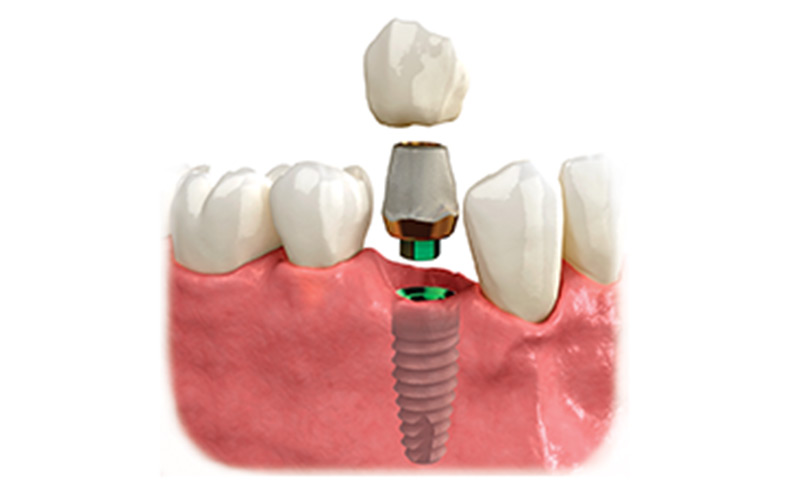Blog
Dental Implants and Dentures - Finding the Best Option For You
June 14, 2022 / DENTISTRY

If you’re missing one or more teeth, chances are you’ve discussed your tooth replacement options with a dental professional. Replacing these teeth is important. Not only does it improve your appearance and self-confidence, but not replacing missing teeth can impact your health and damage your jaw and other teeth.
There were times in history when missing teeth were replaced with dentures made of ivory, bone, metal, and even wood. Thankfully we have better alternatives these days.
You’ve likely heard all about bridges, crowns, implants, and dentures. There are so many options, and so much information available, it can get overwhelming.
For many, the main decision comes down to dentures or dental implants. Here are the pros and cons of both.
Dentures
Dentures are removable and can be built to replace a full or partial set of teeth. Dentures are most often used by patients who need to replace a full set of teeth, but partial dentures are still an option chosen by many.
Pros:
- Dentures are removable, which can be seen as both a pro and a con. Removing dentures makes them easy to clean, and it makes them a good option for patients with unhealthy jawbones that might not be able to withstand an implant.
- Dentures are less expensive than implants. Because dentures don’t require a surgical installation, they are the more cost-effective option.
Cons:
- Dentures are removable, which means they can move around, and denture wearers rely on adhesive to keep them in place. It can be very uncomfortable and embarrassing when a patients’ dentures slide around when they are speaking or eating.
- Dentures that are not properly fitted can lead to tooth decay or infection by allowing food and acids to get stuck underneath the denture.
Dental implants
Dental implants are a permanent tooth replacement option. When you have an implant installed, your dentist will surgically implant a screw-like device right into your jawbone. This implant will act as a firmly rooted post, upon which a crown will be installed to look and function just like your natural tooth.
Pros:
- Dental implants are permanent, meaning you’ll never have to worry about them moving around like a denture. If properly cared for, dental implants can last a lifetime.
- Dental implants look and function like your normal teeth, making them easy to care for through a regular oral hygiene routine that includes regular flossing and twice daily brushing.
Cons:
- Dental implants are surgically installed, which can be uncomfortable and time consuming.
- Dental implants are more expensive than dentures.
In order to be a candidate for dental implant, the jawbone must be healthy and intact.
If you’re missing teeth and are ready to discuss your options, call our team at Yonge Star Dental in Richmond Hill to schedule an appointment today. Dr. Wenyi Yuan would love to see you for a smile consultation. Our office is growing and accepting new patients
Tips to Ensure a Lifetime of Healthy Smiles
May 12, 2022 / DENTISTRY

It’s never too late to start taking care of your teeth. While there is always the potential for accidents to happen that damage your teeth, your oral health is almost entirely in your own hands. Taking care of your teeth and gums will improve your chances of building a bright, healthy smile that can last you a lifetime.
Here is a list of the top 5 things you can do to improve your chances of keeping your natural teeth for life.
1. Brush twice a day
This is possibly the most important thing you can do to keep your teeth and gums healthy. Brush your teeth first thing in the morning and before going to bed at night. Make the most out of your efforts by brushing properly. Use a fluoride toothpaste, and brush for two minutes with a soft-bristled toothbrush, spending about 30 seconds cleaning each quadrant of your mouth.
2. If you can’t brush, rinse
In an ideal world, you’d always have a toothbrush handy to brush your teeth after you eat to wash away the food particles and acids from your teeth before they get caught or start to cause decay. But we all live busy lives, and that’s just not realistic. Consider keeping a small bottle of mouthwash in your car or workplace to have a quick rinse after lunch. If there’s no mouthwash around, rinsing with water is still better than nothing.
3. Floss every day
Flossing your teeth helps clean in areas that are hard to reach with a brush. It also stimulates your gums, preventing gum disease from starting. Sometimes flossing isn’t convenient, but you can help make it easier by leaving floss in areas where you spend a lot of time. Consider keeping some in your TV room at home so you can floss while you’re on the couch in the evening. It only takes a minute or two and it can make a world of difference.
4. Regular dental visits
Nobody’s perfect, and even if you brush and floss regularly, you can still develop tooth decay. The best way to stop small problems from developing into big problems is by seeing your dentist in North Richmond Hill regularly. They’ll clean your teeth properly and take regular x-rays to check out what’s happening beneath the gumline.
5. Be mindful of what you put in your body
The foods and drinks you consume can have a big impact on your oral health. Reach for water instead of pop or juice and try to avoid sugary or acidic foods. Keep in mind that both coffee and wine will stain your teeth over time, so if the colour of your teeth is a major concern of yours, consider limiting your intake of these two beverages.
Following these tips can help you build a healthy smile that lasts well into your senior years. If you’re ready for a professional cleaning and assessment of the current state of your mouth, call the team at Yonge Star Dental to set up an appointment today.




